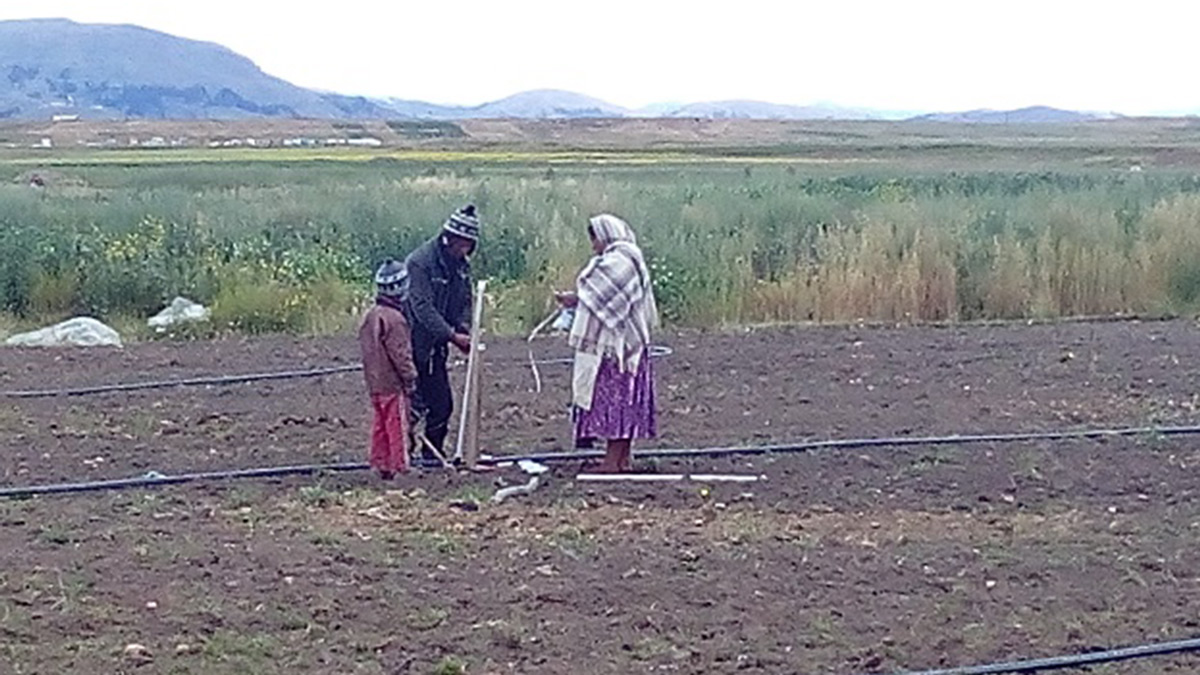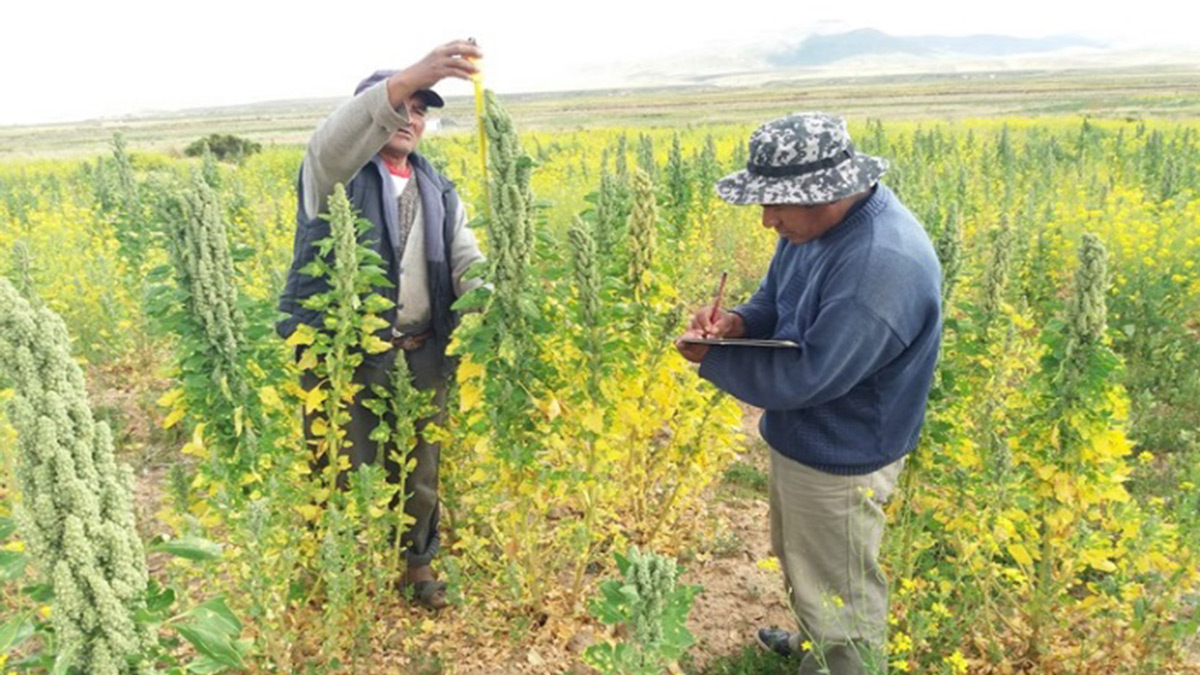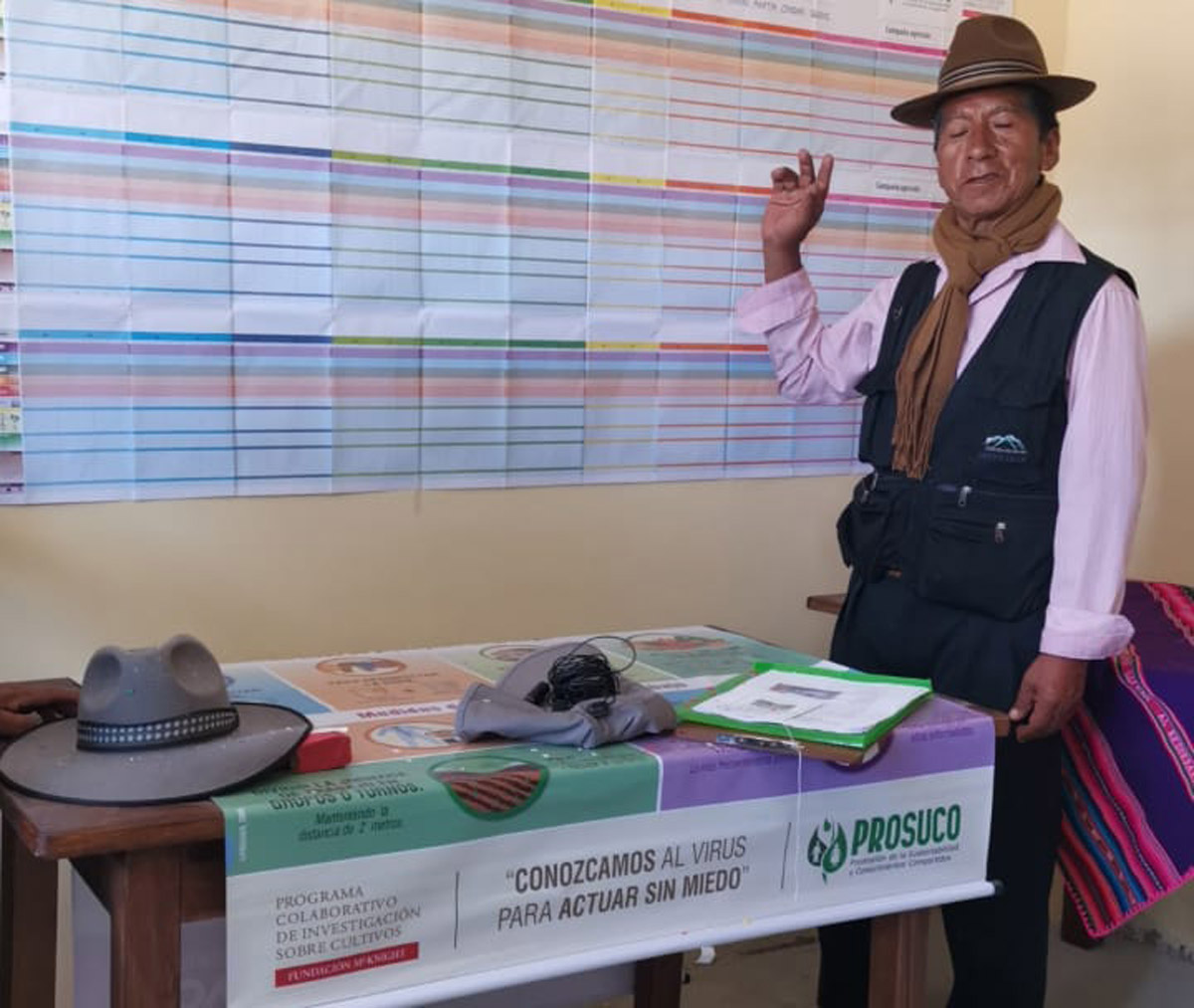FRNs from the High Andes: Breaking Up Research Paradigms
By Magali Garcia
In times of food, production and sustainability crises, the combination of research and innovation is key to achieving agricultural sustainability at a global level. However, innovations developed by farmers are often considered irrelevant. This is a contradiction in itself since farmers must constantly investigate and innovate in order to deal with the risks inherent in farming. Instead, the knowledge and experience of all development actors must come together in synergy to co-create advanced knowledge that fosters a more sustainable agroecosystem. Research/innovation in agriculture must start from an intense interaction between researchers, farmers and technicians.
The physiography and latitude of the tropical Andes create environments that are unique from an eco-system point of view, but are very challenging for farming. Long and recurring periods of daily frosts, short and marked rainy seasons, rugged physiography that allows only small plots, and more, have led to farming practices based on trial-error-observation and repetition, qualities typical of research. Andean farmers repeatedly implement investigative and innovative options that are then shared and validated iteratively. Many results of researcher/farmer activity show rates of success as high or higher than those that can be expected based on advanced technological systems.
The High Andes agroecosystem imposes very limiting conditions that have encouraged Andean farmers to be researchers and innovators by nature, for practically all of their farming decisions. Being subject to intense eco-climatic pressures and having their growing season restricted to just over 4 months with sufficient rainfall and no frost, their decisions must be rigorously analyzed and updated. The modern concept of “resilience” is deep-rooted in the area, as trial-error-innovation is a recurring part of the agricultural cycle.
The Question Arises: Are Andean Farmers Following FRN Principles? Or Do FRNs in Fact Follow the Principles of Andean Farmers?
In accordance with the FRN principles, research carried out by farmers from the High Andes shows the following characteristics:
- Farmers/researchers are men and women of different ages and communities who carry out research and innovations in search of alternative solutions to local problems, rooted in the diversity of productive ecosystems.
- High Andean farmers rigorously monitor their innovations or probabilistic applications, albeit empirically. Temporal and spatial repetition is part of the analysis through multi-year or multi-ecosystem “trials”, even within the same community, taking advantage of the local physiographic variability. Local knowledge is integrated and updated according to what is observed.
- Farmer networks both within and outside the community are the channels by which the findings of research and innovations flow, with exchange of knowledge on successful inputs or advice to avoid failure.
Therefore, the FRN approach is not new, however it does strengthen the knowledge generation system in the high Andes, fitting into an already established context, while adding the integration of researchers/technicians within the FRNs.
Working Alongside Farmers as Part of FRNs to Co-create Knowledge In the Bolivian High Andes
Despite the specificity of the name, the FRN concept does not involve only farmers, but also an intense interaction with the institutional environment. In the present case, the PROINPA Foundation, PROSUCO and the UMSA are components of the global FRN network sponsored by the McKnight Foundation. Under the same principles of diversity, rigor and networking, the three institutions actively support its strengthening. The institutions also interact with each other in order to exchange results and further increase the size and scope of the individual networks. The work is based on participatory approaches, combined with technological innovations agreed upon and incorporated by farmers, with the goal of achieving an effective combination of various options under the socio-ecological context that characterizes small-scale agriculture in the high Andes. Participants propose and define equity in the roles and relationships between researchers/technicians and researchers/farmers, taking advantage of the strong social capital in Andean communities.
Building climate early warning provision systems in the Andes: Increasing the resilience of agroecological systems
The project Building climate early warning provision systems in the Andes: Increasing the resilience of agroecological systems, carried out by UMSA and the University of Missouri, monitors participatory research with producers from seven communities across three municipalities of the Bolivian Altiplano. Climate warning systems are developed through the integration of local and technological knowledge on climate forecasts and the related implementation of productive strategies. The work is informed by the FRN approach, with the ultimate goal of reducing or mitigating the impact of extreme meteorological events. The application of FRN principles has motivated an intense co-creation of knowledge, promoting participation by people of different genders and generations. This is crucial, since young farmers are leaders in the use of technological tools through cell phones and applications. The interaction of researchers/technicians with researchers/farmers with interested farming families has strengthened their knowledge and research skills.
After improving their climate forecasting skills, the groups of researchers/farmers share these experiences with the community during regular meetings, for example during milk collection or association meetings and even in small spaces within community assemblies.
Testimony. (Farmer Altiplano Norte): In recent years, in the group and with the other communities we have shared experiences of putting more well decomposed guano (manure) when we sow potatoes. This year the frost has punished all the communities that are in the pampas (flat areas). But since I have given good fertilizer to my potatoes and I have also watered them when there was no rain and they were small, they have developed better and faster. When the frost fell, my potatoes were bigger than the others and I had good production.

Photo: Research/innovation on the implementation of drip irrigation systems in vegetable plots.
PROINPA Foundation
Over the last four years, the PROINPA Foundation has been implementing the FRN approach based on its three principles: Diverse farmers participate throughout the research process; research is rigorous, democratized and useful focused on agroecological knowledge creation that provides practical benefits to farmers based on their social and biophysical context; and networks are collaborative and facilitate learning and knowledge sharing.
To generate evidence using the FRN approach, the project “Agroecological alternatives to contribute to sustainable quinoa production in Bolivia” worked with Aymara farmers from four communities in the central highlands of Bolivia. To incorporate the concept of rigor, dialogues were convened in which farmers recalled that they have been doing research for millennia and that research is not a new concept. The proposed addition is the co-creation and exchange of knowledge between researchers/farmers and researchers/technicians to obtain better results, applicable to the contexts where they live. Experimental designs are carried out on farmers´ plots, where treatments are the different technologies or practices to be researched, according to need and interest. The experimental units are plots where farmers sow each year, and the lessons learned are shared with other farmers and communities.
The guiding question for the planning is: “What do we want to discover about quinoa varieties?” The groups agreed to identify quinoa varieties best adapted for different agroecological, biophysical and social contexts of the Central Altiplano of Bolivia. Farmers and researchers agreed on the variables to be recorded, and were responsible for collecting and recording the data. The analysis made it possible to explain the patterns and factors of variability that contribute to farmers’ decision-making based on the evidence generated, as it was farmers who defined their experimental units and study varieties for their context. Both the findings as well as the positive and negative experiences have been, and continue to be shared through networks among family members and with other farmers in the community.

Photo: Farmer researchers evaluate the results of quinoa variety trials in farmers’ plots under the FRN approach.
Promotion of Sustainability and Shared Knowledge (PROSUCO in Spanish)
PROSUCO encourages and promotes effective collaboration with local “talented” farmers, calling this process the “Yapuchiri” approach, which is a social innovation of self-training, calibrated to the needs of local contexts. The approach focuses on five steps: 1) learning, 2) testing what is learnt in the context, 3) demonstrating the results with others, 4) sharing and transferring the tested knowledge to their peers through local technical assistance, and 5) networking with other actors. Yapuchiri farmers and PROSUCO collaborate in the co-creation of methodologies, tools and knowledge (especially climate services and bio-inputs) to improve the performance of smallholder agriculture in communities in the Bolivian highlands.
The FRN approach complements the Yapuchiri vision. By collaborating with new communities PROSUCO has integrated it into its activities and made progress in strengthening communal FRNs, in accordance with sociocultural protocols. The lessons learnt show that the work of the FRNs responds to the practical needs of the communities, and that the more cohesive the communities or organizations are, the more dynamic it proves to be. This approach reveals the different capacities that exist in the communities to promote and mobilize agroecological knowledge within local food systems.
“Yapuchiris and farmer researchers are voluntary farmers, not forced, they are “curious” people who are always testing. They are the innovators within the community, with personal aptitudes for sharing their knowledge. They are not selfish and when they accept the responsibility to investigate a certain topic, they do so under the condition that they will “not be judged” by the results they find.” — From: Lessons learned from farmer researchers in the Bolivian highlands from the communities of Viloco, Rosapata Yaribay, Villa Anta, Suramaya, Cutusuma, Chigani Alto and Iquicachi.

Photo: Local Farmer Observer explaining the Pachagrama Agroclimatic register to his peers. Chigani Alto Community, Santiago de Huata Municipality, PROSUCO-2021.
Conclusions
Farming in the High Andes has been and will continue be complex due to the local social and ecological conditions. Climate changes and trends, together with market pressures underscore the need for approaches that can develop capacities and knowledge for adaptation, which in many cases have already been developed by farmers and simply require support. The gap created by reduced government agricultural research support services can be filled strategically by local research systems under the approach of Farmer Researcher Networks (FRNs) interacting with their members and between groups. Participatory research and horizontal collaboration between researchers/farmers and the technical community can contribute to an on-going process of knowledge construction that is adapted and validated in response to changing realities.
Date:
2/17/2022